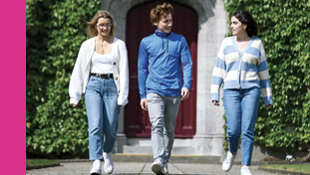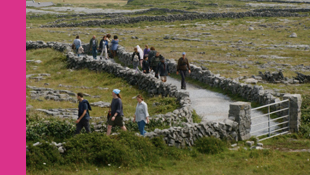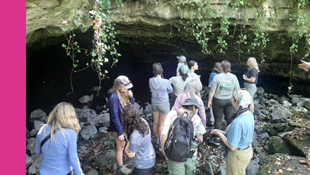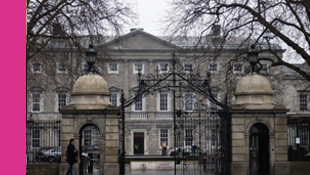-
Courses

Courses
Choosing a course is one of the most important decisions you'll ever make! View our courses and see what our students and lecturers have to say about the courses you are interested in at the links below.
-
University Life

University Life
Each year more than 4,000 choose University of Galway as their University of choice. Find out what life at University of Galway is all about here.
-
About University of Galway

About University of Galway
Since 1845, University of Galway has been sharing the highest quality teaching and research with Ireland and the world. Find out what makes our University so special – from our distinguished history to the latest news and campus developments.
-
Colleges & Schools

Colleges & Schools
University of Galway has earned international recognition as a research-led university with a commitment to top quality teaching across a range of key areas of expertise.
-
Research & Innovation

Research & Innovation
University of Galway’s vibrant research community take on some of the most pressing challenges of our times.
-
Business & Industry

Guiding Breakthrough Research at University of Galway
We explore and facilitate commercial opportunities for the research community at University of Galway, as well as facilitating industry partnership.
-
Alumni & Friends

Alumni & Friends
There are 128,000 University of Galway alumni worldwide. Stay connected to your alumni community! Join our social networks and update your details online.
-
Community Engagement

Community Engagement
At University of Galway, we believe that the best learning takes place when you apply what you learn in a real world context. That's why many of our courses include work placements or community projects.
Irish Studies
Academic Director: Dr. Méabh Ní Fhuartháin
Course Overview
The Irish Studies Summer School comprises an integrated introduction to Irish Studies incorporating elements from all the contributing disciplines, a series of interdisciplinary seminars focusing on key themes in Irish Studies such as Identity, Emigration, and Religion, and a broad range of elective courses as outlined below.
Teaching will be by means of lectures, seminars, dramatic performances, guided tours and informed contact with the music, language and people of Ireland. An interdisciplinary approach will be used within each module and between the modules of the Irish Studies Summer School.
Field trips are an integral part of the programme. Field trips to the Aran Islands, the Burren and the Cliffs of Moher are highlights for all Irish Studies students. Students will go on the following module trips:
- SS115 Representing Ireland – Literature & Film will visit Coole Park, Thoor Ballylee and Kilmacduagh.
- SS116 The Archaeological Heritage of Ireland will visit sites in the Burren.
- SS117 take a trip to an historical pub “The Kings Head” which dates back to the 13th Century to partake in a class debate.
- SS118 Introduction to Art in Ireland will visit the Book of Kells and the National Museum in Dublin. (module not running in 2024)
- SS119 Creative Writing: Poetry and Fiction will attend, and participate in, a number of literary events in Galway City.
- SS120 go on an excursion to the Galway City Museum for a guided tour and discussion.
- SS121 will take a guided cultural walking tour of Galway’s City Centre.
- Students of SS1153 Economic Policy will go on a field trip to the National Parliament of Ireland. (module not running in 2024)
Please note that courses, planned fieldtrips, excursions and additional classes offered in any particular year and are subject to change.
Students will have access to all student service resources outlined here. Assessment for those requiring credit will be carried out on a continuous basis.
You can view biographical material for the academic staff teaching on the Irish Studies Summer School here.
Please see the Irish Studies Student Handbook in the downloads section below.
Course Modules
Please note that SS118 and SS122 are not offered in summer 2024.
SS115 Representing Ireland - Literature and Film (3 Semester Credits/6 ECTS Credits)
This course analyses the differing ways representations of Ireland and Irishness have been created in English-language fiction, poetry, drama and film. The course is structured around themes like the representation of landscape and culture, violence and political culture, the politics of theatre, gender identity, and the meaning of nationality. The course examines cultural nationalism and the continued influences of W.B. Yeats and James Joyce on contemporary Irish writers – from the poetry of Seamus Heaney and Eavan Boland, to the fiction of Patrick McCabe and Claire Keegan. We also view and discuss movies directed by Irish and American film-makers.
SS116 The Archaeological Heritage of Ireland – from the First Settlers to Medieval Castles (3 Semester Credits/6 ECTS Credits)
Ireland’s archaeological heritage is one of the richest in western Europe. The development of prehistoric Irish societies can be seen in the megalithic tombs of the Neolithic, the wealth of bronze and gold in the succeeding Bronze Age, and in the great royal sites such as Tara and Navan of the Celtic Iron Age. This course charts the evidence for human societies in Ireland over ten millennia from the island’s initial colonization by small groups of hunter-gatherers through to the Medieval period. The archaeology of the entire island of Ireland will be covered with particular emphasis on the archaeology of the Burren, a remarkable upland area just south of Galway where archaeological remains of all periods are well preserved and visible.
University of Galway is ideally positioned amongst some of Ireland’s most well-preserved archaeological landscapes and this course includes two trips to visit some of the prehistoric and historic period sites which are highlighted in the lectures.
SS117 Irish History: Conflict, Identity and the Shaping of Modern Ireland (3 Semester Credits/6 ECTS Credits)
This course offers a broad survey of Irish history with a principal focus on the modern centuries, beginning with the Tudor conquest of Ireland. By charting the history of Anglo-Irish relations through major political and military conflicts in the 17th and 18th centuries, special attention will be given to the British attempt to assimilate Ireland under the Act of Union from 1801. We will examine the mass social and political campaigns that emerged in the 17th century and the rise of the modern ideologies of Irish unionism and nationalism, including the influential Irish-American dimension of the latter, which took shape in the decades after the Great Famine (1845-50).
The course will also examine the undoing of the Union between Britain and Ireland in 1921, the nature of the partition agreement which underpinned the constitutional settlement at that time, and how sustained violent conflict in Northern Ireland from the late 1960s forced politicians and political leaders in these islands and beyond, to revisit the ‘Irish Question’.
SS118 Introduction to Art in Ireland: Exploring Ireland’s Vibrant Artistic Heritage from Prehistory to the ‘Golden Age’ of the 8th Century AD (3 Semester Credits/6 ECTS Credits)
(SS118 IS NOT RUNNING IN 2024)
Ireland has a rich and vibrant artistic heritage, extending back to c. 3500 BC; this course traces the development of Irish art beginning with decorated megaliths and the exquisite corpus of Irish Bronze Age gold work, before turning its attention to the introduction of Celtic or La Tène art styles into Ireland around the 4th century BC. Following the Roman conquest of western Europe, the Classical roots of La Tène art re-emerge as a dominant element in Irish art of the first few centuries AD and continue, as a core element in the motif-book of early Christian art, into the 7th and 8th century.
An appreciation of style, symbolism and iconography in Early Christian art is integral to this module and treated in relation to the sublime artistic achievements of the ‘Golden Age’ of Irish art such as illuminated manuscripts, ecclesiastical metalwork such as the Ardagh Chalice and Irish high crosses. This course includes a trip to the National Museum and the Book of Kells Exhibit in Dublin.
SS119 Creative Writing: Poetry and Fiction & Memoir (3 Semester Credits/6 ECTS Credits)
The ability to write well is not an innate talent reserved for the lucky few, but a craft that is earned slowly through paper cuts, piles of crumpled notes, and late hours spent revising. This module will take up the genres of fiction, nonfiction, and poetry, rigorously exploring what makes good writing. Students’ own work will be developed from idea to submission and will be the focus of workshopping exercises. Those who use the course properly can anticipate being a better writer by its conclusion.
Students will improve their ability to work with the larger aspects of fiction and nonfiction, such as writing about the self, dialogue, grounding the narrative, interior monologue and narrative distance. They will hone their skills on the level of the sentence, writing for clarity, tone and voice, as well as use the mechanics of poetry purposefully to affect. Finally, they will learn how to approach their work with a keen eye to improve it in the editing process. Participants will attend literary events in Galway City, for which they will receive credit. Feedback will be given by the course director on an ongoing basis and with the final grade. The final portfolio of each student’s writing will be marked on its execution of craft and on the progress the student has made as a writer during this course.
SS120 Gaelic Culture and Literature; From Cú Chulainn to the Cultural Revival and Beyond
(3 Semester Credits/6 ECTS Credits)
Gaelic literature is the oldest vernacular literature in Western Europe; this course introduces the student to early Gaelic narrative literature and gives insights into the culture(s) which created that literature. Students read and interpret a selection of texts in translation, including tales of Cú Chulainn and the Ulster Cycle, Fionn mac Cumhaill and the Fianna, and tales of the Otherworld, and develop skills in engaging critically with this literature. The course also explores Irish folklore and the oral storytelling tradition, examining the emergence and development of modern Gaelic literature from the period of the Cultural Revival in the late-nineteenth century onwards. Through the reading of selections of Gaelic prose and poetry in translation, students gain insights into the rapid changes within Gaelic culture from the nineteenth century as represented in folklore and literature. A knowledge of Irish is not a prerequisite for the course; all classes are through English. Introductory classes in the Irish language can be provided to interested students.
SS121 Irish Society: Stasis and Change in the Ambiguous Republic
(3 Semester Credits/6 ECTS Credits)
Irish society underwent a complex process of dramatic and relatively rapid social change over the twentieth century, propelling it from being a predominantly rural, Catholic, insular, and socially homogeneous society to become one of the ‘most globalized’ countries in the world, all within just a few short decades. In this module we explore, and explain, aspects of this process, and its effects on Irish society, mainly from a sociological perspective. Using the changing economy as a backdrop, we go on to explore transformations in key social institutions, such as religion, education, the family, the media, politics and power, and the changing role and position of women in Irish society.
No previous knowledge of either sociology or Irish society is required. It will, however, provide a very useful backdrop to the experience of being in Ireland, and offer valuable and critical insights into ‘Irish identity’, and the ambiguities of social change for a small country in a global society.
SS122 Irish Traditional Music and Dance (3 Semester Credits/6 ECTS Credits)
(SS122 IS NOT RUNNING IN 2024)
This module will examine current and historical performance and transmission of Irish traditional dance, instrumental music and song, with specific reference to the traditions of the West of Ireland. Utilizing cultural history frameworks, students will explore the place of traditional performance arts in Irish culture, and the central roles these traditions play in formation of local, national and transnational identities. Core elements include an examination of music in the postfamine period in Ireland; music among the Diaspora; revivals of dance and music; sean-nós song; style and the uilleann piping tradition. Conceptual issues of authenticity and tradition will underscore much of the discussions and central questions such as what constitutes traditional performance and the transformative potential of dance and music will be explored and exemplified through a variety of performance platforms. Students will meet with performers and take seannós song and dance workshops, all of which adds integrated, vocational support to the academic programme. (No previous performance experience is required).
SS1153 Economic Policy in Ireland (3 Semester Credits/6 ECTS Credits)
(SS1153 IS NOT RUNNING IN 2024)
This course is designed to provide students with the analytical and historical foundation for studying contemporary public policy issues in Ireland. It begins with a brief overview of how the Irish economy has evolved in the past 25 years and identifies and outlines a series of key public policy issues in areas such as health, housing, the environment, and social protection. It proceeds to develop an economics framework for analysing these issues which covers the concepts of efficiency, equity, market failure, welfare state, and cost benefit analysis. This framework is then applied to the various public policy issues identified earlier in the course. The course will include a field trip to Dublin to meet key policy advisors and analysts. Pre-requisite for this course is Principles of Micro economics.
Irish Language Classes
Introductory classes in the Irish language are provided for interested students as part of the Irish Studies programme.
Students enrol on TWO of the 9 module options available.
Each module is 3 Credits/6 ECT Credits. Graduate Credit is also available. Special advisory sessions and an extended essay are offered to students wishing to obtain graduate credits.
Date
- Arrival: Sunday 16 June 2024
- Orientation, introductory classes and campus tours: Monday 17 June 2024
- Closing of summer school: Friday 12 July 2024
- Departure: Saturday 13 July 2024
Tuition & Accommodation Costs
- Tuition Cost: €2,260.00
- Accommodation Cost: €1,188.00 for duration of 27 nights, self-catering accommodation in Corrib Village.
Apply
Please refer to our step-by-step guide & tips for applications on our dedicated How to Apply page. If you have any questions on the application process, please contact the course administrator at: summerschool@nuigalway.ie
Applicants are normally required to be university graduates or have completed two full years at university or college level before being admitted to the course. Students should also have attained a minimum GPA of 3.0 on a 4.0 scale (or equivalent).
Application deadline 30 April 2024.
Required documentation
- A copy of your birth certificate or passport
- A digital image/passport photo for your student identity card (headshot)
- An official transcript of examination results
Further Information
Course Administrator
International Summer School Programme
NUI Galway, Galway, Ireland
Tel: +353 91 495442
Fax: +353 91 525051
Email: summerschool@nuigalway.ie



















